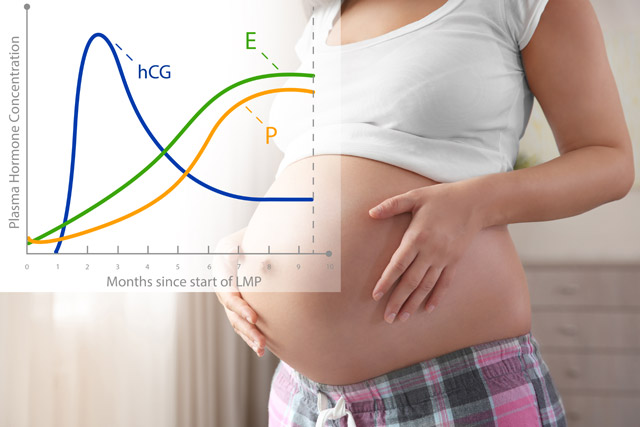The period of pregnancy is the time when a woman passes dozens of tests checking their blood sugar levels, urine, and whatnot. However, there is one test that is done at the very beginning of this long way. We now speak about the test for detecting hCG in the blood.
Women with naturally conceived healthy pregnancies rarely need their levels of HCG to be checked via a blood test. But those struggling to conceive and patients undergoing infertility treatment do pass this test to make sure their pregnancy develops normally. Whatever your case, you might be interested in finding out what HCG levels mean and how this information is important for your doctor. So let’s get down to answering these questions.
What Is hCG? How Can It Be Detected?
Human chorionic gonadotropin, it is also called hCG, is one of the pregnancy hormones. Its production starts early in the pregnancy when the first cells of the future placenta are formed. A blood test detects this constituent as early as 11 days after conception. However, it’s best to check your hCG level 5 weeks after the beginning of your menstrual cycle for better accuracy of the results.
However, this is not the only way to make an hCG test. In fact, every woman that has ever been pregnant has done it – we speak about a home pregnancy test. Its mechanism of detecting pregnancy is based on the presence or absence of this very hormone in the patient’s urine. Unlike beta hCG, which needs blood and is sensitive in the very early days of pregnancy, an urine test will be able to tell if you are expecting a baby or not only two weeks after the possible conception date.
Why Do We Need to Check hCG Levels?
There are several reasons your OB-GYN may want to check your hCG levels week by week.
- They cannot determine the precise gestational term due to your irregular periods.
- You have gone through an IVF and need your hCG blood tests to be done to confirm you are pregnant and your pregnancy is progressing well.
- You have cases of ectopic or molar pregnancy in your medical history and so are at increased risk of repeating the same scenario.
- A doctor suspects a miscarriage or a frozen pregnancy. Checking the amounts of hCG every two days will allow them to see if it increases as it should or declines, thus confirming their suspicions.
What Can This Test Tell about Your Pregnancy?
Checking your hormone levels in early pregnancy can be informative only if done in progress. Let us explain. Every day, starting from the day of fertilization of the egg, your body produces more and more hCG. Normally, its amounts should almost double every couple of days. But by the end of the first trimester, the secretion of this substance reaches its plateau and begins lowering.
Your doctor will probably ask you to pass a blood test no sooner than 5 weeks pregnant. The reason is that hCG levels at 5 weeks can be more informative. Besides, at this point, any abnormalities in the hormone levels can be double-checked with an ultrasound.
Every week of gestation has its own norms for hCG levels. In case your test results don’t fit them, there may be a range of explanations for this. Let’s have a look at what the commonly accepted standard looks like.
Gestational week Normal hCG levels in mIU/mL
| Gestational week | Normal hCG levels in mIU/mL |
| 3 | 6 – 70 |
| 4 | 10 – 750 |
| 5 | 200 – 7,100 |
| 6 | 160 – 32,000 |
| 7 | 3,700 – 160,000 |
| 8 | 32,000 – 150,000 |
| 9 | 64,000 – 150,000 |
| 10 | 47,000 – 190,000 |
| 12 | 28,000 – 210,000 |
| 14 | 14,000 – 63,000 |
| 15 | 12,000 – 71,000 |
| 16 | 9,000 – 56,000 |
| 16 – 29 | 1,400 – 53,000 |
| 29 – 41 | 940 – 60,000 |
Why Are Your Levels Lower Than the Norm?
It may happen so that your hCG levels at 4 weeks show the hormone amounts lower than the expected term of gestation. What can this signal?
- Your pregnancy term is smaller than calculated. This is typical of women who have a long menstrual cycle and those who ovulate later than 14 days after the beginning of their cycle. If you have irregular periods and have no idea when you got pregnant, it may happen so that your week of pregnancy doesn’t coincide with the estimated date of conception.
- It may be a sign of miscarriage or pregnancy that stopped developing.
- You may have an ectopic pregnancy.
Anyway, it’s essential to retest your hCG levels at 5 weeks. If they remain the same or decline, your doctor will send you for an ultrasound check to confirm the diagnosis. In case your levels grew significantly, your pregnancy should be developing well.
Why Are Your Levels Higher Than the Norm?
In case testing your 5-week hCG levels informs about its excessive amounts, it may be a reason for concern or a reason for doubling, tripling, or multiplying your happiness. Let’s start with the possible good news.
- You probably remember that hCG is produced by the placenta. But what if there’s not one but two of them? Or three? Or more? Yes, multiple pregnancies can show through high levels of pregnancy hormones. So if you’ve gone through an IVF or have multiplets running in the family, there is a chance that your week 5 hCG levels signal you are going to become a parent for more than one baby at a time.
- You are wrong with calculating your estimated pregnancy term.
- You have a molar pregnancy. It is a medical condition that requires surgical treatment.
Please, don’t be fast with interpreting your results. Only your OB-GYN who can say if your hCG level at 5 weeks is normal or not.
HCG Levels by Week – Summing up
Learning more about your health condition during pregnancy is essential to preserve your health and do maximum for your pregnancy to be healthy. If your doctor recommends passing an hCG test, there are strong reasons for this. Trust your healthcare specialist, and don’t get nervous if you think anything goes wrong. Bad situations do happen, yet they are rare, and most of the time, you’ll just get another confirmation of your pregnancy developing fine. Good luck!




